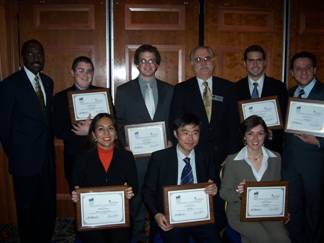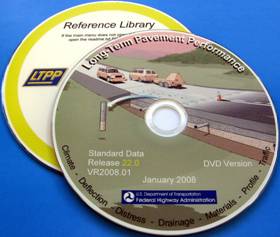U.S. Department of Transportation
Federal Highway Administration
1200 New Jersey Avenue, SE
Washington, DC 20590
202-366-4000
Federal Highway Administration Research and Technology
Coordinating, Developing, and Delivering Highway Transportation Innovations
|
LTPP News This newsletter is an archived publication and may contain dated technical, contact, and link information. |
|
| Publication Number: FHWA-HRT-08-055 Date: Winter 2008 |
Publication Number:
FHWA-HRT-08-055
Issue No: Vol. 4 No. 1 Date: Winter 2008 |
| Email Distribution List |
|
| Contact |
Customer Service
|
At this year’s 87th Annual Transportation Research Board (TRB) Meeting, we held our annual LTPP State Coordinators’ Meeting. This was the 20th year of gathering with our partners to provide updates and information on the activities of the LTPP program. Although we had a very diverse audience from State personnel to university professors and students to consultants, we recognize that many of our key supporters were unable to attend. Those key supporters are our LTPP State Coordinators. As a result, we decided to dedicate this edition of the newsletter to highlight the discussions of the meeting.
The meeting was sponsored by the TRB LTPP Committee. Mr. Bill Temple of the Louisiana Department of Transportation & Development, who serves as a member of this committee, did an excellent job as the moderator for the meeting. The opening remarks (complete speech below) were given by the Federal Highway Administration’s (FHWA) Director of the Office of Infrastructure, Research and Development (R&D), Gary Henderson, followed by presentations from LTPP State Coordinators for Texas, Connecticut, and North Carolina. The meeting concluded with an award presentation to the winners of the Data Analysis Contest and closing remarks from the LTPP Team Leader, Mr. Aramis López.
Opening Remarks by Mr. Gary Henderson
Good morning. I am Gary Henderson, the Director of the Office of Infrastructure R&D. On behalf of Denny Judycki, our Associate Administrator for RD&T, I welcome you to the 20th Annual Long-Term Pavement Performance State Coordinators’ Meeting. Denny sends his apologies for not being able to be here. Denny has always been a strong supporter of LTPP. This will be the first time in over 20 years that Denny will not be in attendance at TRB.
A s I look out at this audience, I can’t help but think back to our first few annual meetings. We were in much larger meeting rooms then. There were many more representatives in attendance from the States, FHWA and TRB. At that time, LTPP was fresh in our minds. As you know, the study was initiated by the Strategic Highway Research Program. Data collection was started in 1989 and management of the program was transferred to FHWA in 1992. And now, 20 annual meetings later, a core group of State Coordinators have remained steadfast in their commitment to this program thus far. We recognize that getting to this point has not been easy. There have been significant challenges such as budget cuts; shifts in program priorities; personnel changes; and technological and policy issues to overcome.
Notwithstanding these difficulties, the LTPP program has continued to progress.
What have “we” accomplished? I admit that I use the term “we” very liberally.
As you are all well aware, numerous research studies and product development activities would not have advanced had it not been for the data we have been able to collect on your State’s highway systems. Without the diligence, patience, and unwavering support of each of you who serve as State Coordinators, none of this would have been possible. So, I offer you my heartfelt thanks and appreciation on behalf of the FHWA and the Nation’s transportation community. You have played a key role in a program that is unlike any other program in the history of transportation research. For that you should take some pride.
Despite the tremendous levels of success and years of effort, the work is not yet done. We still need your enthusiasm and support. Later this morning you will hear from some of your colleagues about the need to continue monitoring, collecting data, and your roles as State Coordinators in the post-2009 time frame.
As we approach 2009, the year that marks the official end of LTPP as we currently know it, these are transition years. We are focusing on completing the original intent of the program by answering the how and why pavements perform as they do. And we must continue to build on the foundation that LTPP has laid for future research projects. For example, as we begin to address the Nation’s aging infrastructure, many of the protocols from the LTPP program will serve as a framework for our long-term infrastructure performance strategy, a component of the FHWA’s [Office of] Research and Development’s Highways of the Future Strategic Plan.
None of us knew that the efforts of those 95 people who gathered at Turner-Fairbank in March 1984 would eventually evolve into a living national asset that would forever change the highway research community. It is expected that the impact and influence of the LTPP program will last for many years to come.
I am extremely proud of the level of long-term cooperation and collaboration that has existed between the three public entities that have successfully managed LTPP for these many years.
While referring to public employees and others who work in the public interest, President Bush once said, “I hope you will never take the honor of public service for granted. Some of us will serve in government for a season; others will spend an entire career here. But we should all dedicate ourselves to great goals. We are not here to mark time, but to make progress, achieve results, and leave a record of excellence.”
To all the field coordinators who have been committed to its success, this program is your record of excellence and I commend you.
I hope you have a successful and enjoyable LTPP and TRB annual meeting. Thank you.
Mr. Jeff Seiders of the Texas Department of Transportation gave an excellent presentation on Texas’ plans for continued monitoring of some of their LTPP test sites after 2009.
Although 2009 marks the official end of the LTPP program as it currently exists, it is very encouraging to see Texas taking the basic concepts of the program and modifying them to meet the specific pavement needs for their State. Texas has the most LTPP test sites and is proactive in performing forensic studies. Also, as a result of LTPP, they developed several pavement databases in-house. Their efforts can possibly serve as a model for other highway agencies.
Ms. Anne-Marie McDonnell of the Connecticut Department of Transportation emphasized to her State counterparts the importance of getting any missing data to LTPP by this summer. She gave a compelling presentation entitled Now is the Time to Get Your Traffic and Other Missing Data to LTPP.
With the 20-year data collection activities coming to a close for the majority of the LTPP test sites, some test sites are still missing traffic, inventory, rehabilitation, and maintenance data. Ms. McDonnell talked about how much has been done through the LTPP program and gave a charge to the States to develop a strategy for getting any missing data to LTPP by making an assessment of what data are missing; writing a plan to get the missing data; then executing the plan to fill the gaps in the pavement performance database. Will this be a challenge to do in such a short time? Yes, but it is not impossible. With a little thought, a little planning, and time to complete this activity, small improvements have big impacts according to Ms. McDonnell.
Ms. Judith Corley-Lay of the North Carolina Department of Transportation gave the audience much to think about in her presentation entitled Role of the LTPP State Coordinators After 2009.
Ms. Corley-Lay has always been an advocate for the LTPP program and stated that each agency needs an advocate. She mentioned that State personnel must inform management of the LTPP products being used in their State. She also suggested that the role for the coordinators will be greater after 2009 than most States realize. Although the 20-year data collection activities are coming to a close for the majority of the LTPP test sites, some test sites will remain active beyond 2009. For example, traffic data will be collected beyond 2009 for select LTPP sites. She mentioned that performance data should continue for these select sites because it is important for the Mechanistic-Empirical Pavement Design Guide (M-E PDG) to tie pavement performance data to traffic data. She also emphasized the importance of looking at the data and sharing data and ideas post-2009.
For copies of the LTPP State Coordinator’s PowerPoint presentations, contact the LTPP Customer Support Service Center by phone at 202-493-3035 or email ltppinfo@fhwa.dot.gov.
The 2007 LTPP/ American Society of Civil Engineers (ASCE) International data analysis contest concluded with an award ceremony held at this year’s LTPP State Coordinators’ Meeting in Washington, DC. Abstracts of the four award-winning papers can be found at: www.fhwa.dot.gov/pavement/ltpp/contest2007.cfm.

Figure 1. 2007 Data Analysis Contest Winners
Top row from left to right: Gary Henderson (FHWA), Jared Richard Wiesman (Penn State), Brian Wolfgang (Penn State), Kam K. Movassaghi (ASCE), Orlando Núñez (Virginia Tech), and Oscar Gonzalez (Virginia Tech). Bottom row from left to right: Vanessa I. Rosales-Herrera (University of Texas Austin), Feng Hong, PhD (University of Texas Austin), and Soly Alvarez Claro (Virginia Tech).
First Place, Undergraduate Category
Observational Study of Unbonded Concrete Overlays in the LTPP Database
Jared Weisman, Brian Wolfgang (Penn State)
Faculty Advisor: Shelley M. Stoffels, D.E.
First Place, Graduate Category
Verification of the Proposed M-E PDG Asphalt Pavement Rehabilitation IRI Model Using the LTPP Database
Orlando Nunez, Soly Alvarez, Oscar González (Virginia Tech)
Faculty Advisor: Gerardo W. Flintsch
Second Place, Graduate Category
Calibrating Fuzzy-Logic-Based Pavement Rehabilitation Decision Models Using the LTPP Database
Chen Chen (Virginia Tech)
Faculty Advisor: Gerardo W. Flintsch
Third Place, Graduate Category
Development of Transverse Crack Initiation Models in Asphalt Pavements by Applying Generalized Linear Models to Long Term Pavement Performance Data
Feng Hong, PhD, Vanessa I. Rosales-Herrera (University of Texas, Austin)
Faculty Advisor: Jorge A. Prozzi, PhD
In addition to holding the State Coordinators’ Meeting, LTPP made available to the public, Standard Data Release (SDR) 22 at the annual TRB meeting. This single DVD release contains the pavement performance data from nearly 2,500 test sections in Microsoft Access® format and can be obtained at no charge.

Highlights of the new SDR include the addition of tables containing data extracted from the LTPP traffic database that have been formatted for use as inputs to the M-E PDG. Also added were new and enhanced tables of in-situ moisture content computed parameters and updated coordinates for most of the LTPP test sections, which were measured using high-precision global positioning receivers. The SDR also includes details on changes made since previous data releases, while a tutorial on “Accessing LTPP Data” provides step-by-step examples of working with the SDR and building queries for data extraction. An accompanying Reference Library DVD provides information on software utilities, resource documents, and research reports that support the database.
For more information or to obtain a copy of SDR 22, contact LTPP Customer Support Services (phone: 202-493-3035, email: ltppinfo@fhwa.dot.gov).
To learn more about the LTPP program and products, visit www.fhwa.dot.gov/pavement/ltpp/index.cfm.
New LTPP Publications
LTPP 2007 Year in Review, FHWA-HRT-08-039
Long Term Pavement Performance Project Laboratory Materials Testing And Handling Guide, FHWA-HRT-07-052